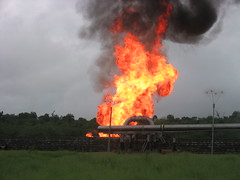
Gas Flaring in Nigeria
An Environmental Health Nightmare

Gas flares burn several stories high throughout the Niger Delta, often within a few hundred yards of communities. Some flares, like the one pictured here, have been burning constantly day and night for over 30 years.
People living in villages near the flares suffer from polluted air and water, and contract asthma and cancer as a result of breathing flare smoke.
Gas flares pollute the air and water
Lack of attention to the problem of flaring in the Niger Delta makes local health impact studies hard to come by, but comparisons to flaring studies elsewhere (where flares tend to be much smaller and more controlled) show that flaring has significant health impacts.
Resources
Poison Fire
Friends of the Earth International
Photos of Shell Oil and Gas Flaring in Nigeria
Friends of the Earth England, Wales, and Northern Ireland
Background on Gas Flaring
Friends of the Earth International
Gas Flaring in Nigeria: A Human Rights, Environmental and Economic Monstrosity
Friends of the Earth International
Harmful Gas Flaring in Nigeria
Friends of the Earth Nigeria
Nigerian Communities Take on Gas Flaring
Climate Justice Programme
People of Nigeria vs. Shell
Friends of the Earth Netherlands
The Oil Industry and Human Rights in the Niger Delta
Nnimmo Bassey, Friends of the Earth Nigeria
- Flares contain as many as 250 toxins and flares emit particulate matter, including sulfur dioxide, nitrogen dioxides and carcinogenic substances as well as unburned fuel components, including benzene, toluene, xylene, and hydrogen sulfide, according to the Canadian Public Health Association. Exposure to several of these substances causes cancer and blood-related disorders.
- Flare smoke can cause aggravated asthma, increases in respiratory symptoms like coughing and difficult or painful breathing, chronic bronchitis, decreased lung function, and premature death, according to the U.S. Environmental Protection Agency.
- Flaring creates acid rain, which corrodes the metal roofs that are often used in the Niger Delta. The rain also acidifies lakes and streams and can kill vegetation.
Gas flaring also contributes to climate change. With so much gas being burned off and wasted, it is estimated that flaring in Nigeria has produced more greenhouse gas emissions than all other sources in sub-Saharan Africa combined.
Gas flaring is wasteful and unnecessary
Flare gas could be processed and used for fuel rather than flared. In the United States, oil companies process and use natural gas or re-inject gas back into the ground, and only about 1 percent of gas is flared. In Nigeria, as much as 60 percent of associated gas is wasted in flares.
In Nigeria, only 40 percent of people have access to electricity. There is a real need for flared gas to be processed, distributed, and used for fuel for cooking or for electricity production. Using processed natural gas as fuel for cooking would replace the firewood that many Nigerians use for cooking and improve indoor air quality.
Gas could also be re-injected back into the ground, a cleaner option that would keep the gas from being burned and creating greenhouse gases.
What is the connection between gas flaring in Nigeria and the United States?
Here in the United States, we depend on Nigeria for 15 percent of our oil. It is U.S.-based oil companies, including Chevron, Exxon, and ConocoPhillips, that are in Nigeria extracting oil and flaring gas. Our reliance on Nigeria’s oil is harming villages, families and children.
Related Posts
Ways to Support Our Work

Read Latest News
Stay informed and inspired. Read our latest press releases to see how we’re making a difference for the planet.

See Our Impact
See the real wins your support made possible. Read about the campaign wins we’ve fought for and won together.

Donate Today
Help power change. It takes support from environmental champions like you to build a more healthy and just world.